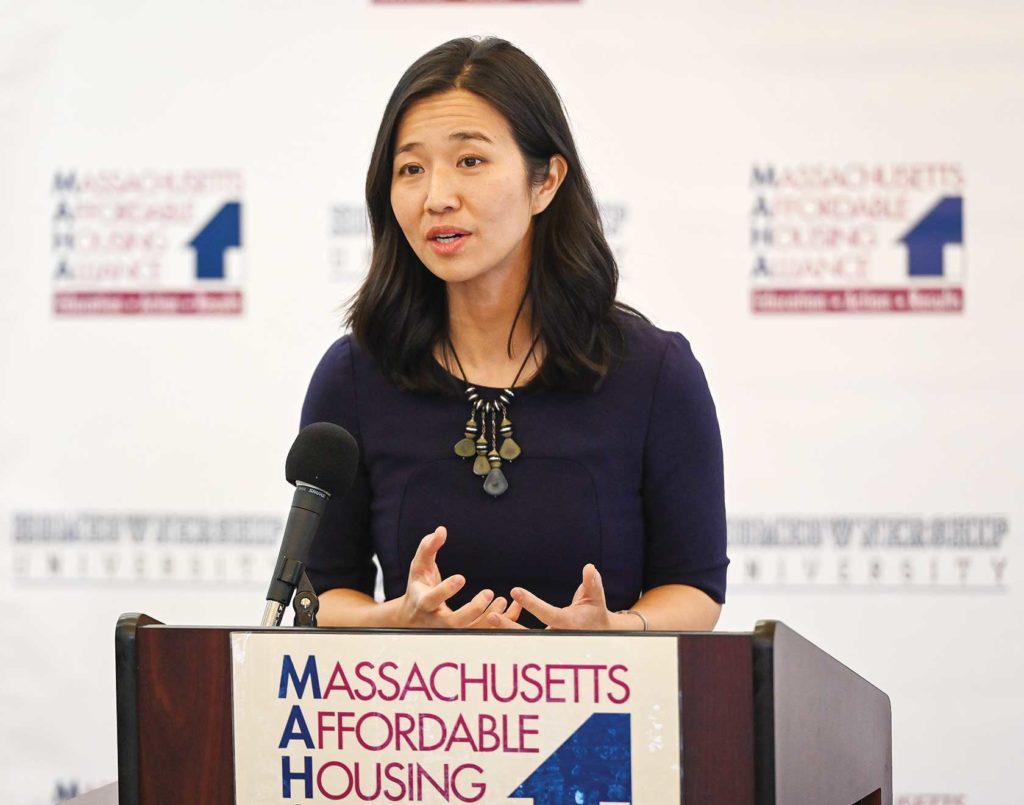
Last week, affordable housing advocates came together to demand that the city take action on the lack of affordable housing across Boston, calling on the Wu administration to increase the amount of affordable rental units, hold developers accountable for their affordable housing agreements and create affordable homeownership opportunities for city residents.
While Mayor Wu has announced plans to prioritize such measures, activists say it’s not happening fast enough.
On Friday, the City Council’s Committee on Housing and Community Development held a hearing to discuss the state of affordable housing and the city’s Inclusionary Development Policy (IDP). Led by Councilor Kendra Lara, committee chair, the three-hour hearing consisted of speaker after speaker demanding that more be done to keep luxury development and displacement at bay.
“How long can we kick this housing crisis can down the road?” one woman asked those gathered in City Hall and via Zoom.
Bostonians are currently facing a difficult housing market, with evictions resuming after the end of the pandemic moratorium, and the evictions are impacting people of color at disproportionate rates, according to Homes for All Massachusetts, Massachusetts Budget and Policy Center and the Massachusetts Law Reform Institute. Moreover, researchers point to the speculative market across Boston pricing out residents in low-income neighborhoods.
Critics say that the problem will continue to worsen if one of the mechanisms designed to counteract such issues — Boston’s IDP — is not updated. First created by executive order in 2000, the policy requires that market-rate residential developments with 10 or more units in need of zoning relief support the creation of income-restricted housing through on-site units, off-site units, or through payment to the IDP Fund managed by the Mayor’s Office of Housing. Currently it requires that 13% of units built be affordable, with affordable considered 70% of the Area Median Income (AMI).
The Coalition for a Truly Affordable Boston, many of whose members spoke Friday, is demanding that the city lower the threshold of units that trigger the IDP, raise the required proportion of affordable units to 33% of new developments, and define affordable as 40% AMI for rentals and 50%–100% for home ownership units.
In response, Wu’s office has promised to conduct a study the feasibility of potential changes to the IDP. Expected to take a “couple of months,” the study will look at a range of options to update the policy, including increasing the proportion of units that are income-restricted to at least 20%, deepening affordability requirements, increasing contribution fees to the IDP Fund and “other reforms so as to better meet Boston’s housing needs.”
Wu announced a proposal Tuesday to invest $106 million to expand opportunities for homeownership for Boston residents, including $60 million through American Rescue Plan Act (ARPA) funds and $46 million in city funds over three years.
In her announcement, the mayor said she hopes to increase homeownership opportunities for households in communities of color and among first-generation homebuyers.
“Homeownership is crucial to building generational wealth and long-term stability for families,” Wu said. “We have an opportunity to transform what homeownership looks like in Boston. These investments will support existing programs for first time homebuyers, build generational wealth for Boston families, and help bring Boston one step closer to becoming a Green New Deal city.”
Part of her administration’s operating budget proposal and federal spending plan filed earlier this month, the proposal includes $60 million in ARPA funds to accelerate production of affordable units, support down payment assistance programs and expand the ONE+Boston Mortgage program, which lowers interest rates for income-eligible buyers.
The ONE+Boston program provides qualified buyers discounts on interest rates based on income. Boston residents who earn between 80% and 100% AMI receive a 0.5% discount rate off the reduced interest rate offered through a state program and residents who earn below 80% AMI will receive up to 1% off of the current state mortgage rate.
The funds from the proposed FY23 Operating Budget are proposed to go toward the completion of ongoing homeownership units being built over the next few years.
Wu is expected to make this proposal to the city council this week.
“Dedicating these federal funds to first-generation and affordable homeownership will anchor our families in Boston and help close the racial wealth gap,” said Councilor Kenzie Bok, chair of the Committee on COVID-19 Recovery. “I’m thankful for the mayor’s partnership and for all the advocates who have pushed the City of Boston to make this enduring commitment.”






